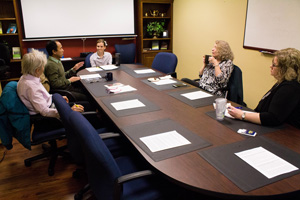Story by Alicia Steele, Staff writer

Faculty discussed gender bias in student evaluations at the Coffee and Conversation meetings.
The Faculty Development Center will continue their series of “Coffee and Conversation” discussion meetings for faculty and professional staff. The series was started last semester by the Faculty Development Center interim coordinator Elizabeth Price.
The Coffee and Conversation discussion occurred Wednesday, Feb. 24 and will be held again Friday, Feb. 26 from 1:30 to 2:30 p.m. in the Faculty Development Center.
The first topic discussed this semester is whether or not student evaluations disadvantage female instructors.
Price said this topic idea came from a study that was published two years ago, during which two instructors, one male and one female, each taught two online courses. During the first course each instructor identified as his or her own gender, and during the second course each instructor identified as the opposite gender.
“These courses were exactly the same,” Price said. “It was the same topic, they were taught the same way, they just taught it once in their own gender and once impersonating the other gender.”
Price said the study found that when an instructor identified as a woman, regardless of who was actually teaching it, they got lower evaluations than instructors who identified as a man.
“The female instructor, when she identified as a man, got higher ones and the male instructor, when he identified as female, got lower ones,” Price said.
Price said another study said that student evaluations of teaching mostly do not measure teaching effectiveness. However, she said that this study found that even in a class in which a student did better with a female instructor, they still gave worse evaluations to the female instructor.
“The concern is that teaching evaluations are weighted in tenure packets,” Price said. “If you have two equal candidates and one has lower teaching evaluations but is female, is that fair?”
Price said that if everything else is equal, teaching evaluations may be closer to equivalent during tenure evaluations if these biases are known.
Price also said she wants to have this discussion because instructors look at student evaluations and some take them very seriously, and by having this discussion, female instructors will be aware of the idea and know that they may have some bias against them.
Marcie Hinton, associate professor of public relations, said, “I do not know that I have ever thought of this issue when it comes to my own evaluations.”
“Gender bias and media tends to be a topic I explore in my contemporary mass media class,” Hinton said. “I would like to see if this conversation can inform my classroom or if there is a dynamic between me and my students that I can better grasp.”
Marcia Hobbs, dean of the School of Nursing and Health Professions, said since she teaches in a dominantly-female area, she does not believe that any evaluations she has received have been due to her gender.
“I do not believe this is a problem at Murray State,” Hobbs said. “But, I teach with mostly women and our students are predominantly women.”
Hobbs said she has always been fascinated by topics related to gender because of her history having both a military career and an academic career, which is what attracted her to this discussion topic.